Frequent persons on Indonesia's street signs
countries
85 names / 1297 streets
Sudirman
 119
Sudirman was a high-ranking Indonesian military officer during the Indonesian National Revolution. The first commander of the Indonesian National Armed Forces, he continues to be widely respected in...
119
Sudirman was a high-ranking Indonesian military officer during the Indonesian National Revolution. The first commander of the Indonesian National Armed Forces, he continues to be widely respected in...
Ahmad Yani
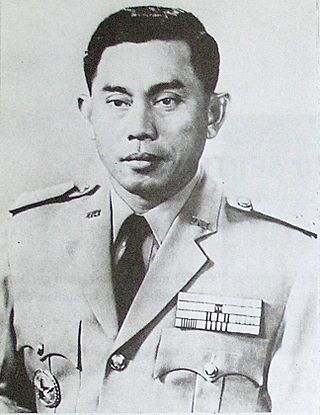 111
General Ahmad Yani was the Commander of the Indonesian Army, and was killed by members of the 30 September Movement during an attempt to kidnap him from his house.
111
General Ahmad Yani was the Commander of the Indonesian Army, and was killed by members of the 30 September Movement during an attempt to kidnap him from his house.
Diponegoro
 57
Prince Diponegoro, also known as Dipanegara, was a Javanese prince who opposed the Dutch colonial rule. The eldest son of the Yogyakarta Sultan Hamengkubuwono III, he played an important role in the...
57
Prince Diponegoro, also known as Dipanegara, was a Javanese prince who opposed the Dutch colonial rule. The eldest son of the Yogyakarta Sultan Hamengkubuwono III, he played an important role in the...
I Gusti Ngurah Rai
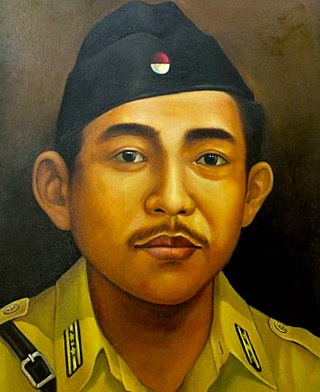 47
Colonel I Gusti Ngurah Rai was an Indonesian National Hero who commanded Indonesian forces in Bali against the Dutch during the Indonesian War of Independence. He was killed in the Battle of...
47
Colonel I Gusti Ngurah Rai was an Indonesian National Hero who commanded Indonesian forces in Bali against the Dutch during the Indonesian War of Independence. He was killed in the Battle of...
Djuanda Kartawidjaja
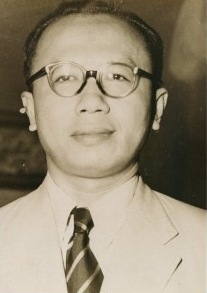 42
Djuanda Kartawidjaja, more commonly referred to mononymously as Djuanda, was an Indonesian politician and technocrat who held various positions during the presidency of Sukarno, most notably as prime...
42
Djuanda Kartawidjaja, more commonly referred to mononymously as Djuanda, was an Indonesian politician and technocrat who held various positions during the presidency of Sukarno, most notably as prime...
Sukarno
 40
Sukarno was an Indonesian statesman, orator, revolutionary, and nationalist who was the first president of Indonesia, serving from 1945 to 1967.
40
Sukarno was an Indonesian statesman, orator, revolutionary, and nationalist who was the first president of Indonesia, serving from 1945 to 1967.
Kartini
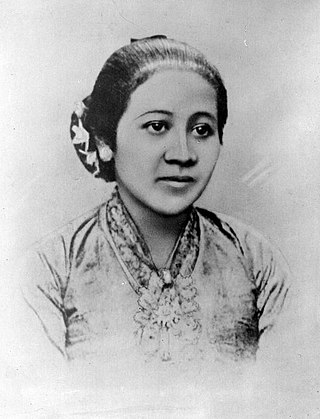 39
Raden Adjeng Kartini, also known as Raden Ayu Kartini, was a prominent Indonesian activist who advocated for women's rights and female education.
39
Raden Adjeng Kartini, also known as Raden Ayu Kartini, was a prominent Indonesian activist who advocated for women's rights and female education.
Gatot Soebroto
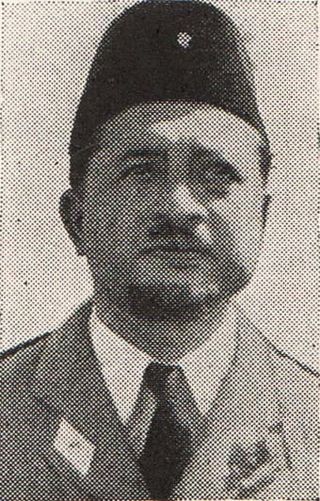 38
General Gatot Soebroto was an Indonesian general who began his military career with the Royal Dutch East Indies Army (KNIL) and rose to be deputy Army chief-of-staff.
38
General Gatot Soebroto was an Indonesian general who began his military career with the Royal Dutch East Indies Army (KNIL) and rose to be deputy Army chief-of-staff.
Tuanku Imam Bonjol
 37
Tuanku Imam Bonjol, also known as Muhammad Syahab, Peto Syarif, and Malim Basa, was one of the most popular leaders of the Padri movement in Central Sumatra. He was declared a National Hero of...
37
Tuanku Imam Bonjol, also known as Muhammad Syahab, Peto Syarif, and Malim Basa, was one of the most popular leaders of the Padri movement in Central Sumatra. He was declared a National Hero of...
Gajah Mada
 37
Gajah Mada, also known as Jirnnodhara, was a powerful military leader and mahapatih of the Javanese empire of Majapahit during the 14th century. He is credited in Old Javanese manuscripts, poems, and...
37
Gajah Mada, also known as Jirnnodhara, was a powerful military leader and mahapatih of the Javanese empire of Majapahit during the 14th century. He is credited in Old Javanese manuscripts, poems, and...
Yos Sudarso
 30
Commodore Yosaphat "Yos" Sudarso was an Indonesian naval officer killed at the Battle of Arafura Sea. At the time of his death, Yos Sudarso was deputy chief of staff of the Indonesian Navy and in...
30
Commodore Yosaphat "Yos" Sudarso was an Indonesian naval officer killed at the Battle of Arafura Sea. At the time of his death, Yos Sudarso was deputy chief of staff of the Indonesian Navy and in...
Maulana Hasanuddin of Banten
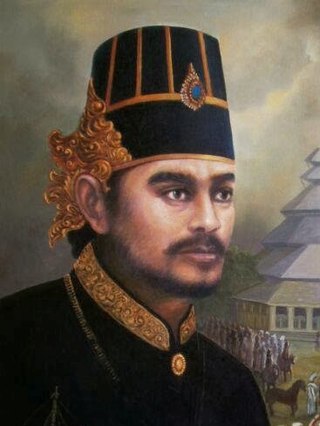 27
Maulana Hasanuddin was a ruler of the Banten Sultanate from c. 1552 to 1570. Hasanuddin was a Azmatkhani Ba 'Alawi Sayyid, the son of Sunan Gunungjati and Nyai Ratu Kawunganten.
27
Maulana Hasanuddin was a ruler of the Banten Sultanate from c. 1552 to 1570. Hasanuddin was a Azmatkhani Ba 'Alawi Sayyid, the son of Sunan Gunungjati and Nyai Ratu Kawunganten.
Mohammad Husni Thamrin
 24
Mohammad Husni Thamrin was a Eurasian-Betawi political thinker and Indonesian nationalist who advocated for the independence of the Dutch colony in the East Indies. After his death, he was regarded...
24
Mohammad Husni Thamrin was a Eurasian-Betawi political thinker and Indonesian nationalist who advocated for the independence of the Dutch colony in the East Indies. After his death, he was regarded...
Teuku Umar
 21
Teuku Umar was a leader of a guerrilla campaign against the Dutch in Aceh during the Aceh War. He fell when Dutch troops launched a surprise attack in Meulaboh. His body was buried in the Mugo area....
21
Teuku Umar was a leader of a guerrilla campaign against the Dutch in Aceh during the Aceh War. He fell when Dutch troops launched a surprise attack in Meulaboh. His body was buried in the Mugo area....
Wahid Hasyim
 20
Abdul Wahid Hasyim was the first Minister of Religious Affairs in the government of President Sukarno of Indonesia, a post he held in 1945, and from 1949 to 1952.
20
Abdul Wahid Hasyim was the first Minister of Religious Affairs in the government of President Sukarno of Indonesia, a post he held in 1945, and from 1949 to 1952.
Pattimura
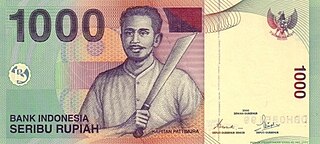 20
Thomas Matulessy, also known as Kapitan Pattimura or simply Pattimura, was a famous Ambonese soldier who became a symbol of both the Maluku and Indonesian struggle for independence, praised by...
20
Thomas Matulessy, also known as Kapitan Pattimura or simply Pattimura, was a famous Ambonese soldier who became a symbol of both the Maluku and Indonesian struggle for independence, praised by...
Siswondo Parman
 19
Lieutenant General Siswondo Parman or more popularly known such as in streets name as S. Parman, was a soldier in the Indonesian Army, and was kidnapped from his home in Jakarta by members of the 30...
19
Lieutenant General Siswondo Parman or more popularly known such as in streets name as S. Parman, was a soldier in the Indonesian Army, and was kidnapped from his home in Jakarta by members of the 30...
Mas Tirtodarmo Haryono
 19
Lieutenant General Mas Tirtodarmo Haryono was a general officer in the Indonesian Army who was killed during an attempt to kidnap him from his home by members of the 30 September Movement in the...
19
Lieutenant General Mas Tirtodarmo Haryono was a general officer in the Indonesian Army who was killed during an attempt to kidnap him from his home by members of the 30 September Movement in the...
Oemar Said Tjokroaminoto
 19
Oemar Said Tjokroaminoto, better known in Indonesia as H.O.S. Tjokroaminoto, was an Indonesian nationalist. He became one of the leaders of the Islamic Trade Union, founded by Samanhudi, which became...
19
Oemar Said Tjokroaminoto, better known in Indonesia as H.O.S. Tjokroaminoto, was an Indonesian nationalist. He became one of the leaders of the Islamic Trade Union, founded by Samanhudi, which became...
Sultan Agung of Mataram
 18
Sultan Anyakrakusuma is known as Sultan Agung was the third Sultan of Mataram in Central Java ruling from 1613 to 1645. He was a skilled soldier who conquered neighbouring states and expanded and...
18
Sultan Anyakrakusuma is known as Sultan Agung was the third Sultan of Mataram in Central Java ruling from 1613 to 1645. He was a skilled soldier who conquered neighbouring states and expanded and...
Hayam Wuruk
 18
Hayam Vuruk (1334–1389), also called Rajasanagara, Pa-ta-na-pa-na-wu, or Bhatara Prabhu after 1350, was a Javanese Hindu emperor from the Rajasa dynasty and the 4th emperor of the Majapahit Empire....
18
Hayam Vuruk (1334–1389), also called Rajasanagara, Pa-ta-na-pa-na-wu, or Bhatara Prabhu after 1350, was a Javanese Hindu emperor from the Rajasa dynasty and the 4th emperor of the Majapahit Empire....
Untung Surapati
 17
Untung Suropati also Untung Surapati was an Indonesian warfighter who led a few rebellions against the Dutch East India Company (VOC). Some of his exploits were written in Babad Tanah Jawi.
17
Untung Suropati also Untung Surapati was an Indonesian warfighter who led a few rebellions against the Dutch East India Company (VOC). Some of his exploits were written in Babad Tanah Jawi.
Katamso Darmokusumo
 17
Katamso Darmokusumo was the commander of Military District (Korem) 072 in the Diponegoro Area Military command of the Indonesian Army in Central Java. He was kidnapped and killed by members of the 30...
17
Katamso Darmokusumo was the commander of Military District (Korem) 072 in the Diponegoro Area Military command of the Indonesian Army in Central Java. He was kidnapped and killed by members of the 30...
King Siliwangi
 17
King Siliwangi or Prabu Siliwangi was a semi-legendary great king of the Hindu Sunda kingdom before the coming of Islam in West Java.
17
King Siliwangi or Prabu Siliwangi was a semi-legendary great king of the Hindu Sunda kingdom before the coming of Islam in West Java.
Ahmad Dahlan
 17
Kyai Haji Ahmad Dahlan, often abbreviated to K.H. Ahmad Dahlan, was an Indonesian Muslim religious leader and revivalist, who established the Muhammadiyah organization. Which would become one of the...
17
Kyai Haji Ahmad Dahlan, often abbreviated to K.H. Ahmad Dahlan, was an Indonesian Muslim religious leader and revivalist, who established the Muhammadiyah organization. Which would become one of the...
Basuki Rahmat
 16
Major General (Ret) Basuki Rahmat was an Indonesian general, National Hero and a witness to the signing of the Supersemar document transferring power from President Sukarno to General Suharto.
16
Major General (Ret) Basuki Rahmat was an Indonesian general, National Hero and a witness to the signing of the Supersemar document transferring power from President Sukarno to General Suharto.
Soengkono
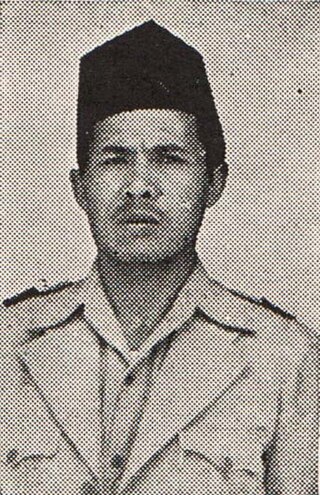 15
Mayor Jenderal TNI (Purn.) Soengkono adalah seorang tokoh militer Indonesia dan merupakan tokoh dalam Pertempuran Surabaya 10 November 1945 di Surabaya, Jawa Timur. Saat itu ia menjabat komandan BKR....
15
Mayor Jenderal TNI (Purn.) Soengkono adalah seorang tokoh militer Indonesia dan merupakan tokoh dalam Pertempuran Surabaya 10 November 1945 di Surabaya, Jawa Timur. Saat itu ia menjabat komandan BKR....
Soetomo
 15
Soetomo was an Indonesian physician and nationalist. He was the co-founder of Boedi Oetomo, the first native political society in the Dutch East Indies, and led the Great Indonesia Party (Parindra)...
15
Soetomo was an Indonesian physician and nationalist. He was the co-founder of Boedi Oetomo, the first native political society in the Dutch East Indies, and led the Great Indonesia Party (Parindra)...
Oerip Soemohardjo
 14
General Raden Oerip Soemohardjo was an Indonesian general, the first chief of staff of the Indonesian National Armed Forces, and the interim Commander of the Indonesian National Armed Forces. He...
14
General Raden Oerip Soemohardjo was an Indonesian general, the first chief of staff of the Indonesian National Armed Forces, and the interim Commander of the Indonesian National Armed Forces. He...
Dewi Sri
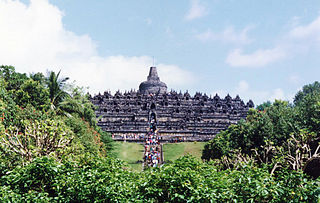 13
Dewi Sri or Shridevi is the Javanese, Sundanese, and Balinese Hindu Goddess of rice and fertility, still widely worshiped on the islands of Java, Bali and Lombok, Indonesia. She is often associated...
13
Dewi Sri or Shridevi is the Javanese, Sundanese, and Balinese Hindu Goddess of rice and fertility, still widely worshiped on the islands of Java, Bali and Lombok, Indonesia. She is often associated...
Sutoyo Siswomiharjo
 13
Major General Sutoyo Siswomiharjo was an Indonesian general who was kidnapped and later murdered during the attempted coup by the 30 September Movement.
13
Major General Sutoyo Siswomiharjo was an Indonesian general who was kidnapped and later murdered during the attempted coup by the 30 September Movement.
Prince Antasari
 13
Prince Antasari, also known by his Indonesian name Pangeran Antasari, was a sultan of Banjar and is a National Hero of Indonesia. His son Prince Hijrah is one of the leaders of The Navy.
13
Prince Antasari, also known by his Indonesian name Pangeran Antasari, was a sultan of Banjar and is a National Hero of Indonesia. His son Prince Hijrah is one of the leaders of The Navy.
Arif Rahman Hakim
 13
Arif Rahman Hakim adalah mahasiswa Fakultas Kedokteran Universitas Indonesia yang meninggal karena ditembak sewaktu berlangsungnya demonstrasi mahasiswa yang menuntut Tri Tuntutan Rakyat (Tritura)...
13
Arif Rahman Hakim adalah mahasiswa Fakultas Kedokteran Universitas Indonesia yang meninggal karena ditembak sewaktu berlangsungnya demonstrasi mahasiswa yang menuntut Tri Tuntutan Rakyat (Tritura)...
Rasuna Said
 11
Hajjah Rangkayo Rasuna Said was a campaigner for Indonesian independence and women's rights, particularly their rights to education and participation in politics. Being politically active herself...
11
Hajjah Rangkayo Rasuna Said was a campaigner for Indonesian independence and women's rights, particularly their rights to education and participation in politics. Being politically active herself...
Soeprapto (general)
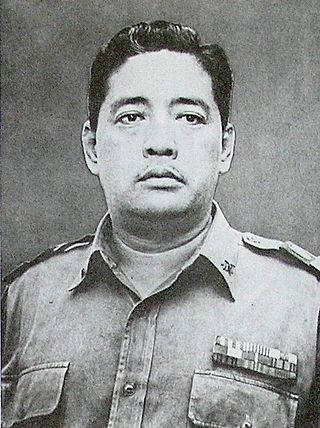 11
Lieutenant General R. Soeprapto was the Second Deputy Commander of the Indonesian Army, and was kidnapped from his home in Jakarta by members of the 30 September Movement in the early hours of 1...
11
Lieutenant General R. Soeprapto was the Second Deputy Commander of the Indonesian Army, and was kidnapped from his home in Jakarta by members of the 30 September Movement in the early hours of 1...
Dewi Sartika
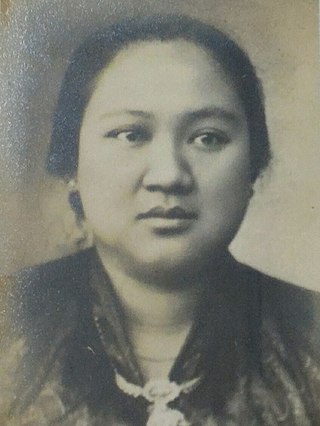 11
Dewi Sartika was an advocate for and pioneer of education for women in Indonesia. She founded the first school for women in the Dutch East Indies. She was honoured as a National Hero of Indonesia in...
11
Dewi Sartika was an advocate for and pioneer of education for women in Indonesia. She founded the first school for women in the Dutch East Indies. She was honoured as a National Hero of Indonesia in...
Pierre Tendean
 11
Pierre Andries Tendean was an Indonesian Army lieutenant. He was best known as a victim of the 30th September Movement (G30S) and posthumously awarded as revolution hero, later Indonesian national...
11
Pierre Andries Tendean was an Indonesian Army lieutenant. He was best known as a victim of the 30th September Movement (G30S) and posthumously awarded as revolution hero, later Indonesian national...
Nakula
 11
Nakula was the fourth of the five Pandava brothers in the ancient Indian epic, the Mahabharata. He and his twin brother Sahadeva were the sons of Madri, one of the wives of the Pandava patriarch...
11
Nakula was the fourth of the five Pandava brothers in the ancient Indian epic, the Mahabharata. He and his twin brother Sahadeva were the sons of Madri, one of the wives of the Pandava patriarch...
Wahidin Soedirohoesodo
 11
Wahidin Soedirohoesodo (1852–1917) was a medical doctor and education reformer in the Dutch East Indies who co-founded the Javanese self-improvement society Budi Utomo. Therefore, he is sometimes...
11
Wahidin Soedirohoesodo (1852–1917) was a medical doctor and education reformer in the Dutch East Indies who co-founded the Javanese self-improvement society Budi Utomo. Therefore, he is sometimes...
Eddy Martadinata
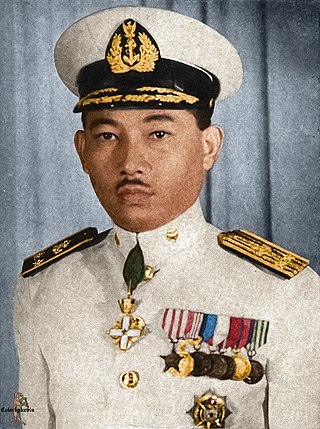 10
Admiral Raden Eddy Martadinata was an Indonesian Navy admiral and diplomat. He was given the title of National Hero of Indonesia posthumously in 1966. He is recognized as one of the founders of the...
10
Admiral Raden Eddy Martadinata was an Indonesian Navy admiral and diplomat. He was given the title of National Hero of Indonesia posthumously in 1966. He is recognized as one of the founders of the...
Arjuna
 10
Arjuna, also known as Partha and Dhananjaya, is a protagonist of the Hindu epic Mahabharata. In the epic he is the third of five Pandava brothers, from the lineage of the Kuru. In the Mahabharata...
10
Arjuna, also known as Partha and Dhananjaya, is a protagonist of the Hindu epic Mahabharata. In the epic he is the third of five Pandava brothers, from the lineage of the Kuru. In the Mahabharata...
Wage Rudolf Supratman
 10
Wage Rudolf Soepratman was an Indonesian journalist and songwriter who wrote both the lyrics and melody of the national anthem of Indonesia – "Indonesia Raya". He is an Indonesian National Hero.
10
Wage Rudolf Soepratman was an Indonesian journalist and songwriter who wrote both the lyrics and melody of the national anthem of Indonesia – "Indonesia Raya". He is an Indonesian National Hero.
Djamin Ginting
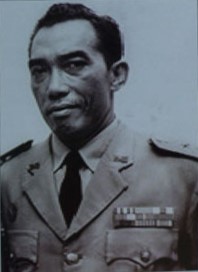 10
Lieutenant General Djamin Ginting, was an Indonesian military officer and independence fighter from Tanah Karo. He was appointed a National Hero of Indonesia by President Joko Widodo on 7 November...
10
Lieutenant General Djamin Ginting, was an Indonesian military officer and independence fighter from Tanah Karo. He was appointed a National Hero of Indonesia by President Joko Widodo on 7 November...
I Gusti Ketut Jelantik
 9
I Gusti Ketut Jelantik (-1849) was a Balinese Prime Minister of the state of Buleleng, who resisted the imposition of Dutch treaties.
9
I Gusti Ketut Jelantik (-1849) was a Balinese Prime Minister of the state of Buleleng, who resisted the imposition of Dutch treaties.
Robert Wolter Mongisidi
 9
Robert Wolter Mongisidi was part of Indonesia's struggle for independence from the Dutch in South Sulawesi.
9
Robert Wolter Mongisidi was part of Indonesia's struggle for independence from the Dutch in South Sulawesi.
Agus Salim
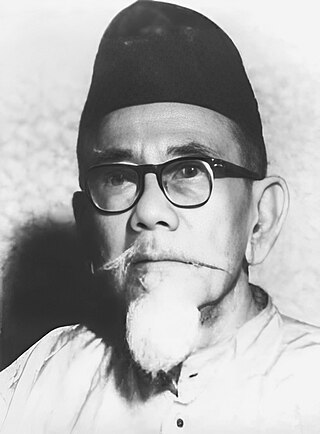 9
Haji Agus Salim was an Indonesian journalist, diplomat, and statesman. He served as Indonesia's Minister of Foreign Affairs between 1947 and 1949.
9
Haji Agus Salim was an Indonesian journalist, diplomat, and statesman. He served as Indonesia's Minister of Foreign Affairs between 1947 and 1949.
D. I. Pandjaitan
 9
Major General Donald Isaac Pandjaitan was an Indonesian General who was killed during a kidnap attempt by the members of the 30 September Movement. Among the 6 Army Generals who perished during the...
9
Major General Donald Isaac Pandjaitan was an Indonesian General who was killed during a kidnap attempt by the members of the 30 September Movement. Among the 6 Army Generals who perished during the...
Si Singamangaraja XII
 8
Patuan Bosar Sinambela ginoar Ompu Pulo Batu, better known as Si Singamangaraja XII, was the last priest-king of the Batak peoples of north Sumatra. In the course of fighting a lengthy guerrilla war...
8
Patuan Bosar Sinambela ginoar Ompu Pulo Batu, better known as Si Singamangaraja XII, was the last priest-king of the Batak peoples of north Sumatra. In the course of fighting a lengthy guerrilla war...
T. B. Simatupang
 8
Tahi Bonar Simatupang was a soldier who served in the Indonesian National Revolution and went on to become chief of staff of the Indonesian Armed Forces.
8
Tahi Bonar Simatupang was a soldier who served in the Indonesian National Revolution and went on to become chief of staff of the Indonesian Armed Forces.
Iskandar Muda
 8
Iskandar Muda was the twelfth Sultan of Acèh Darussalam, under whom the sultanate achieved its greatest territorial extent, holding sway as the strongest power and wealthiest state in the western...
8
Iskandar Muda was the twelfth Sultan of Acèh Darussalam, under whom the sultanate achieved its greatest territorial extent, holding sway as the strongest power and wealthiest state in the western...
Fatmawati
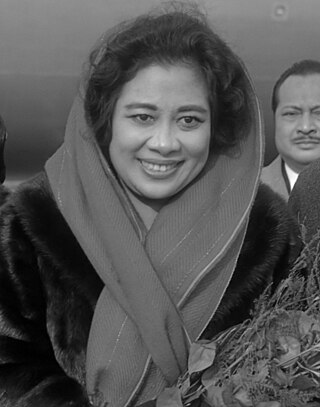 8
Fatmawati was a National Hero of Indonesia. As the inaugural First Lady of Indonesia, she was the third wife of the first president of Indonesia, Sukarno, and the mother of Indonesia's first female...
8
Fatmawati was a National Hero of Indonesia. As the inaugural First Lady of Indonesia, she was the third wife of the first president of Indonesia, Sukarno, and the mother of Indonesia's first female...
Soeprapto (prosecutor)
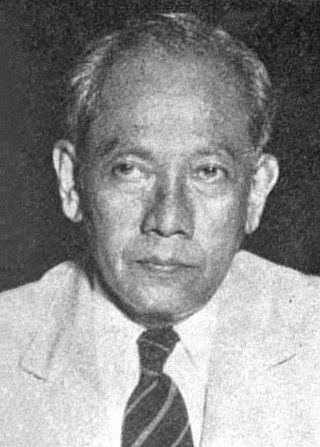 7
Soeprapto was the fourth Attorney General of Indonesia. Born in Trenggalek, East Java, Soeprapto studied law in Jakarta, finding work in the legal system soon after graduating in 1920. After...
7
Soeprapto was the fourth Attorney General of Indonesia. Born in Trenggalek, East Java, Soeprapto studied law in Jakarta, finding work in the legal system soon after graduating in 1920. After...
Ki Hajar Dewantara
 7
Raden Mas Soewardi Soerjaningrat ; from 1922 also known as Ki Hadjar Dewantara, which is also written as Ki Hajar Dewantoro to reflect its Javanese pronunciation, was a leading Indonesian...
7
Raden Mas Soewardi Soerjaningrat ; from 1922 also known as Ki Hadjar Dewantara, which is also written as Ki Hajar Dewantoro to reflect its Javanese pronunciation, was a leading Indonesian...
Mulavarman
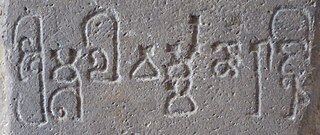 7
Sri Mulavarman Nala Deva, was the king of the Kutai Martadipura Kingdom located in eastern Borneo around the year 400 CE. What little is known of him comes from the seven Yupa inscriptions found at a...
7
Sri Mulavarman Nala Deva, was the king of the Kutai Martadipura Kingdom located in eastern Borneo around the year 400 CE. What little is known of him comes from the seven Yupa inscriptions found at a...
Samanhudi
 6
Hadji Samanhudi was the founder of Sarekat Dagang Islam, an organization in Indonesia that previously served as an association for batik traders in Surakarta, and later broadened its scope to...
6
Hadji Samanhudi was the founder of Sarekat Dagang Islam, an organization in Indonesia that previously served as an association for batik traders in Surakarta, and later broadened its scope to...
Sutami
 6
Prof. Dr. (H.C.) Ir. Sutami atau Soetami adalah seorang insinyur sipil yang pernah menjabat Menteri Pekerjaan Umum Indonesia. Ia sudah menjadi Menteri sejak tahun 1964 pada Kabinet Dwikora I masa...
6
Prof. Dr. (H.C.) Ir. Sutami atau Soetami adalah seorang insinyur sipil yang pernah menjabat Menteri Pekerjaan Umum Indonesia. Ia sudah menjadi Menteri sejak tahun 1964 pada Kabinet Dwikora I masa...
Sam Ratulangi
 6
Gerungan Saul Samuel Jacob Ratulangi, known as Sam Ratulangi, was a Minahasan teacher, journalist, politician, and national hero from North Sulawesi, Indonesia. He was part of the committee that...
6
Gerungan Saul Samuel Jacob Ratulangi, known as Sam Ratulangi, was a Minahasan teacher, journalist, politician, and national hero from North Sulawesi, Indonesia. He was part of the committee that...
Oto Iskandar di Nata
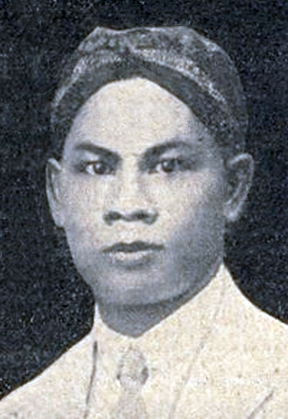 5
Oto Iskandar di Nata was an Indonesian politician and National Hero.
5
Oto Iskandar di Nata was an Indonesian politician and National Hero.
Slamet Rijadi
 5
Brigadier General Ignatius Slamet Rijadi was an Indonesian soldier.
5
Brigadier General Ignatius Slamet Rijadi was an Indonesian soldier.
Kunti
 5
Kunti, born Pritha, is a prominent figure in the Hindu epic Mahabharata. Recognized for her pivotal role as the mother of Karna and the Pandavas, the central protagonists of the narrative, she is...
5
Kunti, born Pritha, is a prominent figure in the Hindu epic Mahabharata. Recognized for her pivotal role as the mother of Karna and the Pandavas, the central protagonists of the narrative, she is...
Tuanku Tambusai
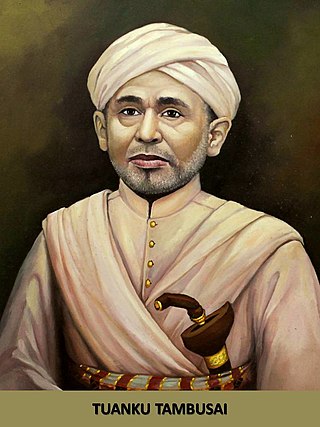 5
Sheikh Haji Muhammad Saleh, better known as Tuanku Tambusai, was an Islamic leader in the Padri movement. He fought the Adat and Dutch colonists during the Padri Wars in 1838, along with his...
5
Sheikh Haji Muhammad Saleh, better known as Tuanku Tambusai, was an Islamic leader in the Padri movement. He fought the Adat and Dutch colonists during the Padri Wars in 1838, along with his...
Daan Mogot
 5
Major Daniel Elias Mogot was a military officer involved in the Indonesian National Revolution. He was part of a group that established the Tangerang Military Academy and became its first director....
5
Major Daniel Elias Mogot was a military officer involved in the Indonesian National Revolution. He was part of a group that established the Tangerang Military Academy and became its first director....
Mas Mansoer
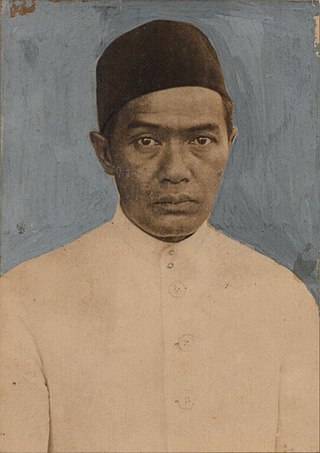 5
Mas Mansoer was an Indonesian religious leader who served as the 4th chairman of Muhammadiyah from 1937 to 1942. He was declared a national hero by President Sukarno in 1964.
5
Mas Mansoer was an Indonesian religious leader who served as the 4th chairman of Muhammadiyah from 1937 to 1942. He was declared a national hero by President Sukarno in 1964.
Margonda
 4
Margonda, meninggal di usia 27 tahun dalam pertempuran ketika pasukannya menyerang tentara Inggris di Kali Bata pada 16 November 1945) adalah salah seorang pejuang kemerdekaan. Namanya diabadikan...
4
Margonda, meninggal di usia 27 tahun dalam pertempuran ketika pasukannya menyerang tentara Inggris di Kali Bata pada 16 November 1945) adalah salah seorang pejuang kemerdekaan. Namanya diabadikan...
Sutan Sjahrir
 4
Sutan Sjahrir was an Indonesian politician, and revolutionary independence leader, who served as the first Prime Minister of Indonesia, from 1945 until 1947. Previously, he was a key Indonesian...
4
Sutan Sjahrir was an Indonesian politician, and revolutionary independence leader, who served as the first Prime Minister of Indonesia, from 1945 until 1947. Previously, he was a key Indonesian...
Keumalahayati
 4
Keumalahayati, or Malahayati, was an admiral of the Aceh Sultanate navy, which ruled the area of modern Aceh Province, Sumatra, Indonesia. She was the first woman admiral in the modern world. Her...
4
Keumalahayati, or Malahayati, was an admiral of the Aceh Sultanate navy, which ruled the area of modern Aceh Province, Sumatra, Indonesia. She was the first woman admiral in the modern world. Her...
Hasyim Asy'ari
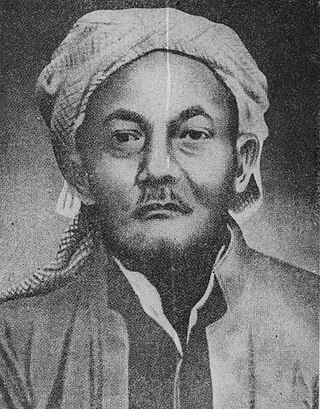 4
Kyai Haji Hasyim Asy'ari was an Indonesian ulama, National Hero and founder of Nahdlatul Ulama.
4
Kyai Haji Hasyim Asy'ari was an Indonesian ulama, National Hero and founder of Nahdlatul Ulama.
Ario Soerjo
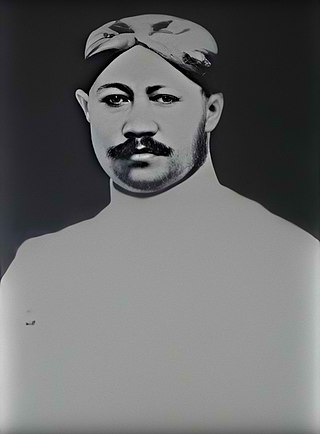 4
Raden Mas Tumenggung Ario Soerjo is now regarded as a National Hero of Indonesia. Soerjo and two policemen were captured by pro-communist (PKI) troop at Walikukun, Widodaren, Ngawi on 9 November...
4
Raden Mas Tumenggung Ario Soerjo is now regarded as a National Hero of Indonesia. Soerjo and two policemen were captured by pro-communist (PKI) troop at Walikukun, Widodaren, Ngawi on 9 November...
Mohammad Yamin
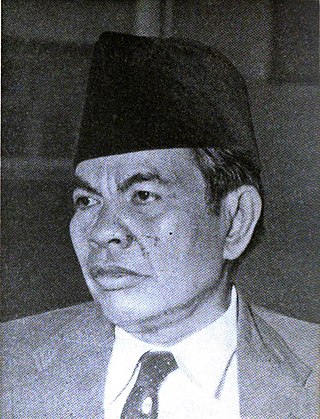 4
Mohammad Yamin was an Indonesian poet, politician, and national hero who played a key role in the writing of the draft preamble to the 1945 constitution.
4
Mohammad Yamin was an Indonesian poet, politician, and national hero who played a key role in the writing of the draft preamble to the 1945 constitution.
Adam Malik
 3
Adam Malik Batubara was an Indonesian politician, diplomat, and journalist, who served as the third vice president of Indonesia from 1978 until 1983, under President Suharto. Previously, he served in...
3
Adam Malik Batubara was an Indonesian politician, diplomat, and journalist, who served as the third vice president of Indonesia from 1978 until 1983, under President Suharto. Previously, he served in...
Soerjadi Soerjadarma
 3
Air Chief Marshal (Ret.) Elang Soerjadi Soerjadarma was the Commander of the Indonesian National Armed Forces from 1959 to 1962 and the Chief of Staff of the Indonesian Air Force from 1946 to 1962.
3
Air Chief Marshal (Ret.) Elang Soerjadi Soerjadarma was the Commander of the Indonesian National Armed Forces from 1959 to 1962 and the Chief of Staff of the Indonesian Air Force from 1946 to 1962.
Benyamin Sueb
 3
Benyamin Sueb was an Indonesian comedian, actor and singer. He released 46 studio albums and starred in more than 50 films. He received two Citra Awards for Intan Berduri in 1973 and Si Doel Anak...
3
Benyamin Sueb was an Indonesian comedian, actor and singer. He released 46 studio albums and starred in more than 50 films. He received two Citra Awards for Intan Berduri in 1973 and Si Doel Anak...
Dewi Ratih
 3
Dewi Ratih, also known as Sang Hyang Ratih or Sang Hyang Semara Ratih, is a Hindu lunar goddess worshipped in Java and Bali. She is well known for her beauty and grace, thus she was also known as the...
3
Dewi Ratih, also known as Sang Hyang Ratih or Sang Hyang Semara Ratih, is a Hindu lunar goddess worshipped in Java and Bali. She is well known for her beauty and grace, thus she was also known as the...
Soepomo
 3
Soepomo was an Indonesian politician and lawyer who served as the country's first Minister of Justice from August until November 1945 and again from December 1949 until 6 September 1950. Known as the...
3
Soepomo was an Indonesian politician and lawyer who served as the country's first Minister of Justice from August until November 1945 and again from December 1949 until 6 September 1950. Known as the...
Sutomo
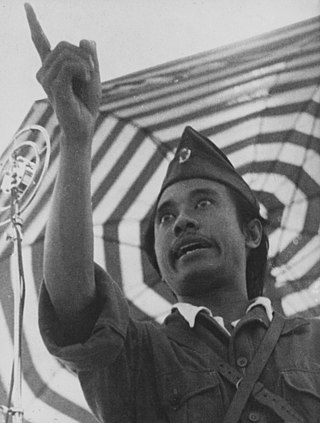 3
Sutomo, also known as Bung Tomo, was an Indonesian freedom fighter, and is best known for his role as an Indonesian military leader during the Indonesian National Revolution against the United...
3
Sutomo, also known as Bung Tomo, was an Indonesian freedom fighter, and is best known for his role as an Indonesian military leader during the Indonesian National Revolution against the United...
Abdul Haris Nasution
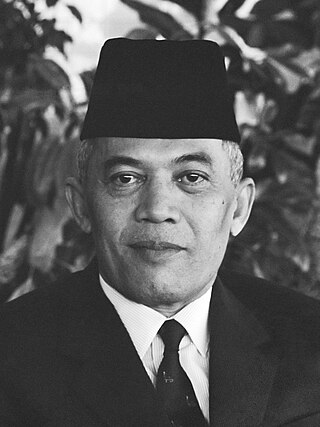 3
Abdul Haris Nasution was a high-ranking Indonesian general and politician. He served in the military during the Indonesian National Revolution and he remained in the military during the subsequent...
3
Abdul Haris Nasution was a high-ranking Indonesian general and politician. He served in the military during the Indonesian National Revolution and he remained in the military during the subsequent...
Darsono (militer)
 3
Letnan Jenderal TNI (Purn.) Darsono, adalah seorang Purnawirawan TNI-AD yang sebelumnya menjabat sebagai Wakil Kepala Staf TNI Angkatan Darat.
3
Letnan Jenderal TNI (Purn.) Darsono, adalah seorang Purnawirawan TNI-AD yang sebelumnya menjabat sebagai Wakil Kepala Staf TNI Angkatan Darat.
Ciung Wanara
 3
Ciung Wanara is a legend among Sundanese people, in Indonesia. Ciung Wanara was a nickname of Prince Manarah of Sunda–Galuh Kingdom. He was a relative of the famous King Sanjaya of Mataram.
3
Ciung Wanara is a legend among Sundanese people, in Indonesia. Ciung Wanara was a nickname of Prince Manarah of Sunda–Galuh Kingdom. He was a relative of the famous King Sanjaya of Mataram.
Ranggawarsita
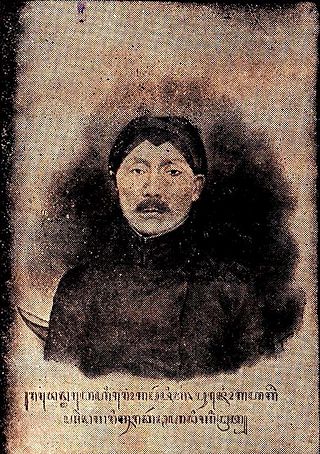 3
Raden Ngabehi Ranggawarsita was a Javanese philosopher and poet. He was born into the famous literary Yasadipura family in Surakarta, in Central Java. He is sometimes called the last Javanese poet.
3
Raden Ngabehi Ranggawarsita was a Javanese philosopher and poet. He was born into the famous literary Yasadipura family in Surakarta, in Central Java. He is sometimes called the last Javanese poet.
Ide Anak Agung Gde Agung
 3
Ide Anak Agung Gde Agung, alternatively spelled too as Ida Anak Agung Gde Agung, was an Indonesian ethnic-Balinese politician, historian, and National Hero, who was the Raja of Gianyar, Bali, and...
3
Ide Anak Agung Gde Agung, alternatively spelled too as Ida Anak Agung Gde Agung, was an Indonesian ethnic-Balinese politician, historian, and National Hero, who was the Raja of Gianyar, Bali, and...
Iswahyudi
 3
Air Commodore Iswahyudi was an Indonesian airman and National Hero. On 14 December 1947, the plane he was flying with Halim Perdanakusuma crashed off the coast of Tanjung Hantu Hill, Perak, Malayan...
3
Air Commodore Iswahyudi was an Indonesian airman and National Hero. On 14 December 1947, the plane he was flying with Halim Perdanakusuma crashed off the coast of Tanjung Hantu Hill, Perak, Malayan...
Sedap Malam
 3
Sedap Malam is a 1951 film directed by Ratna Asmara and produced by Djamaluddin Malik for Persari. Starring Sukarsih and M. Pandji Anom, it follows a woman who descends into prostitution after her...
3
Sedap Malam is a 1951 film directed by Ratna Asmara and produced by Djamaluddin Malik for Persari. Starring Sukarsih and M. Pandji Anom, it follows a woman who descends into prostitution after her...
Raden Patah
 3
Raden Patah, also known as Jin Bun was the first sultan of the Demak Sultanate. Ascending to the throne in 1475, he remained a vassal of the Majapahit Empire until 1478. Raden Patah took the title...
3
Raden Patah, also known as Jin Bun was the first sultan of the Demak Sultanate. Ascending to the throne in 1475, he remained a vassal of the Majapahit Empire until 1478. Raden Patah took the title...
Abdullah Abdul Kadir
 3
Abdullah bin Abdul al Kadir (1796–1854) also known as Munshi Abdullah, was a Malayan writer. The term Munshi means "teacher" or "educator". He was a famous Malacca-born munshi of Singapore and died...
3
Abdullah bin Abdul al Kadir (1796–1854) also known as Munshi Abdullah, was a Malayan writer. The term Munshi means "teacher" or "educator". He was a famous Malacca-born munshi of Singapore and died...
Iwa Koesoemasoemantri
 3
Iwa Koesoemasoemantri was an Indonesian politician. Born in Ciamis, West Java, Iwa graduated from legal school in the Dutch East Indies and Netherlands before spending time at a school in the Soviet...
3
Iwa Koesoemasoemantri was an Indonesian politician. Born in Ciamis, West Java, Iwa graduated from legal school in the Dutch East Indies and Netherlands before spending time at a school in the Soviet...